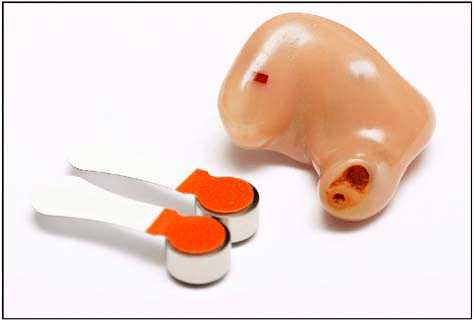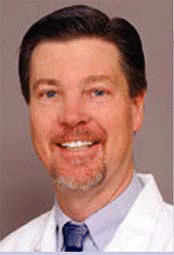TORONTO-An estimated 31 million Americans are affected by some level of hearing loss and, as the population ages, that number will continue to rise. That equates to a steadily increasing demand for hearing aids, which in turn equates to an increasing demand for health care professionals qualified to dispense those hearing aids. And who, more than an otolaryngologist, is qualified and better positioned to step up and meet that demand? Answer: No one.
Explore This Issue
November 2006That was the consensus of a panel of hearing loss experts, who convened to discuss the subject at the recent American Academy of Otolaryngology-Head and Neck Surgery (AAO-HNS) annual meeting here.
Hearing aids are well within the scope of practice for the otolaryngologist, probably more so than any professional in the industry, said Brad H. Volkmer, MBA, President and CEO of EPIC Hearing Health Care, who served as moderator for the discussion.
Indeed, an AAO-HNS survey found that most otolaryngology practices do have an audiologist working within the practice, and approximately 68 to 70% of otolaryngology practices currently dispense hearing aids.
Unfortunately, in most of those practices, it’s a well-kept secret, said J. Douglas Green, Jr., MD, of Jacksonville Hearing and Balance in Jacksonville, FL. It’s not something that the average person on the street would even be aware of-that they could go to their otolaryngologist’s office and get a hearing aid. That’s because, as a specialty, we haven’t done a very good job of making people aware that we do have hearing aids and we do dispense them.
Where are patients currently getting their hearing aids? Some go to their physician, some go to an audiologist, but many go to state-licensed hearing aid specialists, who may or may not have had any formal medical education. And that is arguably not in the best interests of most patients, the panelists agreed.
Advantage: Otolaryngologists
Otolaryngologists are unique in their ability to treat the entire spectrum of hearing loss…and that really sets us apart as a specialty and in our potential to treat patients with hearing loss, Dr. Green said. Often, serious medical problems can be heralded by hearing loss; we’re all aware of unilateral hearing loss and the potential for an acoustic neuroma, for example.

And problems like that can only be addressed when an otolaryngologist is involved in the care of patients who are getting a hearing aid.
The overlap between otolaryngology and hearing aid dispensing is really quite significant, added Neil A. Giddings, MD, of Spokane Ear, Nose & Throat in Washington. Our audiologists are trained to obtain medical information, so it is not uncommon for a patient to come in to get a hearing aid and wind up seeing one of our rhinologists as well to get treated for sleep apnea or sinus problems.
Consciousness-Raising Required
What do otolaryngologists need to do in order to raise awareness and enhance this potentially rewarding and clinically significant aspect of their practices? Marketing and advertising.
First, you also have to decide what exactly you want to be in the hearing health care industry, Dr. Giddings said. If you just want to sell hearing aids, you can do the same things the hearing aid dispensers do-you can take out big ads and you will probably get more hearing aid sales. But, if you want to be a leader in the community whom people look to so they can be sure they are getting the correct medical care and are getting fitted correctly, then it takes more than that and it takes higher standards.
How do you maintain those higher standards and compete with the aggressive and high-visibility marketing and advertising tactics of the non-physician hearing aid dispensers? You don’t try to compete with them; you try to set yourself apart from them.
The hearing aid dispensers advertise all the time in the newspaper, and some of them may be unethical. So, how do we compete against them? Dr. Giddings continued. My feeling is that, as otolaryngologists, with all of the technology available to us, our ability to diagnose problems of the ear and the trust that our patients put in our expertise, the real question should be, ‘How can the hearing aid dispensers compete against us?’
Marketing Methods
Their inherent credibility and position in the community is the most valuable marketing tool otolaryngologists have, Dr. Green noted.
Probably under-recognized and undervalued, but a significant part of the potential for otolaryngologists in dispensing hearing aids, is that we are respected members of our communities, he said. People will listen to their doctor. The white coat gives you the respect that will enable you to prescribe a hearing aid to someone and be confident that individual will wear and utilize the hearing aid.
Although many physicians feel that advertising and marketing their practice somehow diminishes their credibility, Dr. Giddings believes it is an important and effective way to raise awareness of the otolaryngologist’s presence in the hearing aid industry. He admitted, though, that there was quite a bit of initial apprehension in the office when his practice began advertising.
We wondered if we were lowering our professional standards, Dr. Giddings said. Were we becoming like the hearing aid dispensers, or worse yet, were we starting to look like attorneys advertising? So we took baby steps.
They began with some simple direct mail pieces, then some small newspaper ads, eventually stepping up to some targeted advertising on radio and cable television, which has provided the practice a pretty satisfying return on investment, Dr. Giddings said.
You probably didn’t see our ad during the Super Bowl last year, but cable TV is an incredible medium for advertising and I don’t think a lot of people realize it, he said. We are seeing returns of tens of thousands of dollars by running those ads on a monthly basis. The TV companies know exactly who is watching what shows, how old they are, how much money they make, and so on. The demographic information they have on their audiences is just phenomenal.
Open houses, patient education seminars, health fairs, and other community events are other effective avenues for otolaryngologists to connect with their communities and market their practices. And with advances in both the science and the technology of hearing loss, the panelists emphasized that there in no time like the present for otolaryngologists to make their presence known in the hearing aid industry.
Partially implantable hearing aids are available and totally implantable hearing aids on the near horizon, Dr. Green said. There’s the area of electrical acoustic stimulation and the fact that hearing aids are being combined now with cochlear implants. In fact, there’s a hybrid device that is being tested now through a couple of different manufacturers of cochlear implants. Otolaryngologists are in position to move into those areas.
©2006 The Triological Society

Leave a Reply